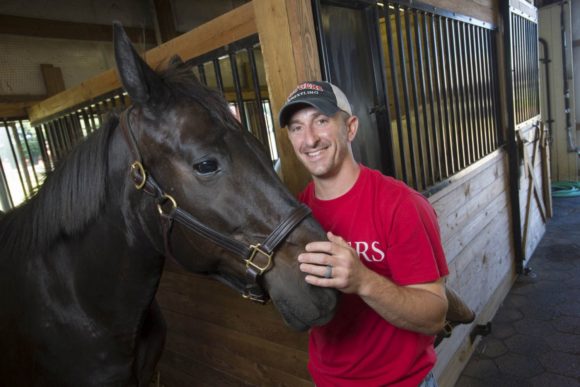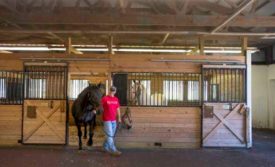
Anthony Sacchetti oversees the care of all 26 horses that live on the 150-acre Rutgers Farm. Photo: Nick Romanenko.
“I tell students this is the coolest class you are going to take at Rutgers. You are going to get dirty, you are going to get uncomfortable but realize it’s in the pursuit of you learning something and leaving different than when you came.” – Anthony Sacchetti
Some days when Anthony Sacchetti is teaching students how to handle and care for horses at the Rutgers Farm he has to rip up his lesson plans.
During a class when he plans to talk about hay quality, Sacchetti can end up instead giving an impromptu lesson in how to clean and doctor a horse’s foot, working with Gus, a 27-year-old Paint gelding being treated for a hoof abscess.
It’s the kind of hands-on training Sacchetti believes is invaluable for animal sciences majors in the School of Environmental and Biological Sciences. And it can’t be replicated in a classroom, he said.
“You can look at a book and learn about the anatomy of a horse, but how to interact with these animals cannot be taught outside of this setting,’’ said Sacchetti. “If the Rutgers Farm didn’t exist a big chunk of the students’ knowledge base would be gone.’’
Sacchetti, a senior research animal worker, oversees the care of all 26 horses that live on the 150-acre Rutgers Farm, which spans both sides of Route 1 in New Brunswick. He is one of nine full-time support staff members who care for all 225 animals on the farm, including the cattle, goats, sheep and one of the largest pig herds in New Jersey.
Of the horses under Sacchetti’s care, three are part of Rutgers Mounted Patrol, a student-run unit of the Rutgers University Police Department. Four of the horses are part of a dedicated teaching herd that students work with as part of the two-credit horse practicum Sacchetti teaches. Faculty work with the remaining horses for research into nutrition, exercise physiology and other topics.

Sacchetti believes the Rutgers Farm provides invaluable hands-on training for animal sciences majors in the School of Environmental and Biological Sciences.
Sacchetti was an unlikely candidate to become Rutgers’ version of the horse whisperer. As an undergraduate studying animal science, Sacchetti thought he was bound for a career working indoors doing research in the pharmaceutical industry.
After graduating from Rutgers in 2002, he accepted a position in the small animal facility on the G.H. Cook campus caring for the rats and mice while he weighed his next steps.
Then he was unexpectedly transferred in a personnel shift, assigned to take care of the horses at the farm.
“I asked if there was some sort of training program I could get into because it was the third time in my life I had ever touched a horse,’’ Sacchetti said.
Sacchetti worked side by side with his supervisor to learn how to feed, groom and care for the horses, clean their hooves to prevent infection and administer medication and vaccines. His learned to read their body language and developed a relationship with the animals. He is now a skilled caretaker and enthusiastic advocate for how the farm improves students’ experience and education at Rutgers.
He also serves as an ambassador to the community, giving tours to public school children. He enjoys sharing his understanding of the animals and helping students develop an appreciation of agriculture.
“In the span of an hour you can change someone’s mind forever,’’ he said.
Sacchetti recognizes his job may not appeal to everyone. Some of the less glamorous aspects are cleaning out the stalls and chasing horses in the fields when they don’t want to return to the barn.
“You are constantly dirty, you are constantly being shoved around by animals, sometimes you are working in unforgivable conditions,’’ Sacchetti said. “But I love it. I love teaching and I love working with the animals.’’
His favorite part of the job is watching students become more comfortable handling the horses, even those who were the most fearful when they first walked in to the barn. Sacchetti believes the skills students develop as they learn how to interact with the horses and care for them can apply to any career path they choose.
At the beginning of each semester, he promises students that they are in for a transformative experience.
“I tell them this is the coolest class you are going to take at Rutgers,’’ Sacchetti said. “You are going to get dirty, you are going to get uncomfortable but realize it’s in the pursuit of you learning something and leaving different than when you came.’’
Editor’s Note: this article originally appeared in Rutgers Today

